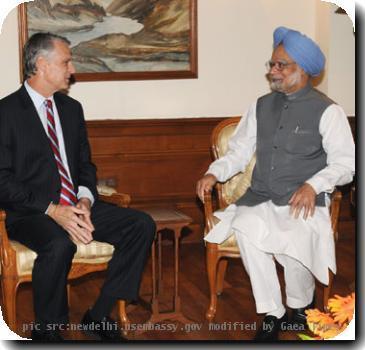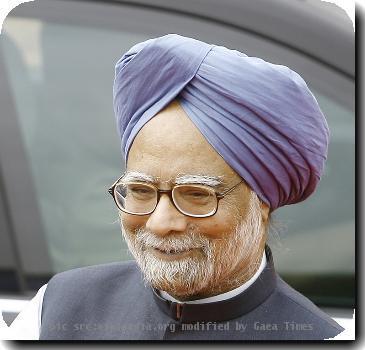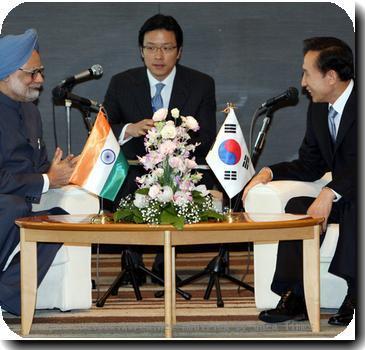British prime minister works to deepen economic, political ties while on trip to India
By Tim Sullivan, APThursday, July 29, 2010
British PM works to deepen Indian economic ties
NEW DELHI — British Prime Minister David Cameron said Thursday that his visit to India had deeply strengthened the bonds between Britain and its former colony, whose burgeoning economy he wants to help his own country recover from a brutal recession.
Cameron and Prime Minister Manmohan Singh hailed a string of agreements to build the countries’ political, security and cultural ties, and Singh said he wanted Indo-British trade to double in the next five years.
The two countries “are natural partners to shape a better world,” Singh said at a news conference shortly before Cameron was to return home after his two-day visit. “If we join hands together we can make a meaningful contribution to addressing the challenges of global poverty and development, reform of global institutions, terrorism and climate change.”
The focus, though, was on finances, as Cameron dispatched Cabinet ministers and business leaders to major Indian cities to drum up new business and improve ties.
Just five years ago, Britain was the 5th largest exporter to India. Today, it is the 18th. Exports to India dropped from 4.12 billion pounds ($6.4 billion) in 2008 to 2.9 billion ($4.5 billion) in 2009.
In the past few years, Indo-British ties have been eclipsed by dramatically warming relations between New Delhi and Washington, and the United States has become one of India’s most important allies and trade partners.
But with India’s economy booming and Britain’s still struggling, Cameron desperately wants to catch up. He said his visit had “well and truly put in place the basis for an enhanced and enduring partnership.”
Certainly, progress was made during the trip. The British government announced a series of deals Thursday between India and British architectural, high-tech and defense firms. That followed an announcement in Bangalore on Wednesday that India would buy 57 Hawk advanced trainer jets from Britain in a deal worth nearly $1.1 billion.
But many of those deals had been in the works for a long time, and whether Cameron’s “enduring partnership” will actually take hold will only be made clear by agreements still to come.
The Hindustan Times noted in a Thursday editorial that it is easy to mistake Indian friendliness for firm agreements, and said Cameron faced the position of “working up a charm offensive in an atmosphere where the island nation needs India more than India needs the island nation.”
Cameron, meanwhile, also delicately tried to move past a diplomatic row he created when he appeared to accuse Pakistan of aiding terror groups.
No one “doubts, least of all the Pakistan government itself, that there has been in Pakistan — and there still is in Pakistan — terrorist organizations like LET and others which need to be cracked down on and eliminated,” he said at the news conference.
Pakistan has made some moves against terror organizations, he said, but “it still needs to take further steps and we need to make sure we’re doing everything we can to assist them.”
LET, or Lashkar-e-Taiba, is a Pakistan-based militant group believed to be behind the Mumbai attacks. India accuses the Pakistan intelligence agency of backing the now-banned group — a charge Islamabad denies.
On Wednesday, Cameron infuriated Islamabad when he said Britain wanted a strong, democratic Pakistan, “but we cannot tolerate in any sense the idea that this country is allowed to look both ways and is able, in any way, to promote the export of terror, whether to India, whether to Afghanistan or to anywhere else in the world.”
Pakistan reacted angrily, saying the statement undermined the importance of its role in the fight against terrorism.
“These comments are an immature reaction from an immature politician,” Wajid Shamsul Hasan, Pakistan’s ambassador to Britain, told The Associated Press. “On the one hand, Cameron says he wants Pakistan to have a strong democracy that will survive and prosper, but this kind of statement is only going to fuel extremists.”
In his comments, Singh also said he hoped peace talks between India and Pakistan, which broke down after the Mumbai attacks and have never fully resumed, would eventually begin again in earnest.
Singh gently chided the Pakistani foreign minister for his criticism of the most recent round of talks, held earlier this month in Pakistan, but said he hoped “we will sooner or later be able to restore the dialogue” and give the peace process “its proper sense of purpose.”
While Cameron took pains to show deference to India during his visit, there was a limit.
He appeared taken aback when he was asked in a Wednesday interview whether Britain would return the 106-carat Koh-i-noor diamond, which had been mined in India and was passed among Indian and central Asian rulers for centuries before being given to Queen Victoria in 1849. It is now part of Britain’s Crown Jewels.
“If you say yes to one (request) you suddenly find the British Museum would be empty,” Cameron told NDTV. “I think I’m afraid to say, to disappoint all your viewers, I’m afraid it’s going to have to stay put.”
Associated Press writer Paisley Dodds in London contributed to this report.
Tags: Asia, Europe, India, Islamabad, Manmohan Singh, Mumbai, New Delhi, Pakistan, South Asia, Terrorism, United Kingdom, Western Europe


